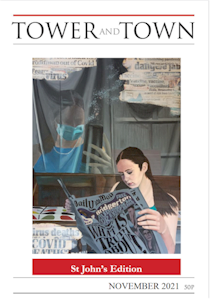

Tower and Town, November 2021 (view the full edition) (view the full edition)LitFest Report"All that glisters is not gold: is there still a place for Shakespeare in a 21st-century curriculum?": the St John's Sixth Form LitFest Debate. Ten St John's Sixth Form students volunteered to launch the Marlborough Literature Festival with a debate. The event was held on the September 30 at the Town Hall, asking 'Should we still be teaching Shakespeare in this day and age?' The students explored the idea with a well-rounded knowledge about whether students should be taught the "out-dated", "confusing" and even "violent" work of Shakespeare - a white male playwriter from centuries ago. In this debate I witnessed all students getting involved and interacting with each other's points and listening to all areas of concern. The atmosphere - although a disagreement was playing out - was upbeat and enticing. The audience was appreciative of any mic malfunctions students faced, or humour relating to exactly how Shakespeare is taught and whether it is the work of the teacher, not the writer, when pupils find the language difficult. Many discrete chuckles and even all-out laughter enveloped the atmosphere of the hall to make all the students feel clearly comfortable to elaborate points and have their concerns validated. The first issue of discussion to be brought to attention was, "All that glisters is not gold. Is Shakespeare's reputation earned?" Students were quick to defend and oppose. Does the fact that Shakespeare's plays created significant change in English culture overcome any argument that his plots were stolen? Nevertheless, there are issues in his plays that he is not held accountable for; so if we can disregard some aspects of Shakespeare's plays, why not as a whole? The issue of whether Shakespeare's work is challenging or just problematic was discussed throughout the debate. Most students leaned towards the opinion that his work needs to be known for its importance in our history but would rather have a more diverse selection of novels to discuss in English Literature, which as it stands, is becoming a less popular subject to be taken forward from GCSE. Another matter brought up was the age at which students should start learning Shakespeare, or at least come to terms with his work. Most agreed that none or hardly any of his plays are light in subject matter, so think it fitting that we don't "dive right in" at the beginning of year 7 with such force. Some students thought that Shakespeare should only be taken from the start of the GCSE course. Overall, the debate was supposed to be a light-hearted and charismatic event to start the LitFest and I can report the students fulfilled their purpose. With good humour, they brought up serious, educated points on which we should all be focusing for future generations. The main take-away I received from the debate was that Shakespeare should indeed be taught in school, especially in history and drama as Shakespeare holds a strong place in both topics, but also in English, whether that be in A-level or GCSE or lower years depending on the person, but not to the perhaps overloaded extent that it is being taught currently. Yasmin Lester, Year 11 |